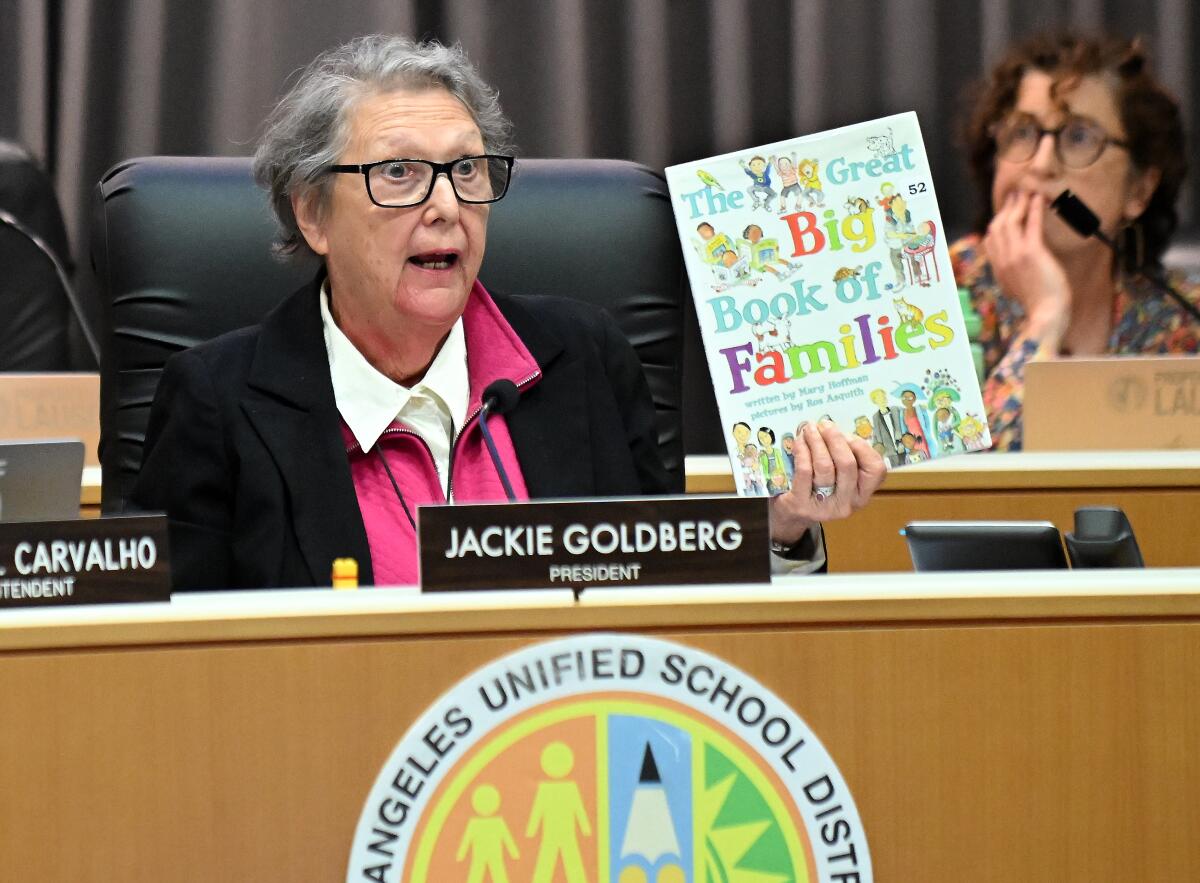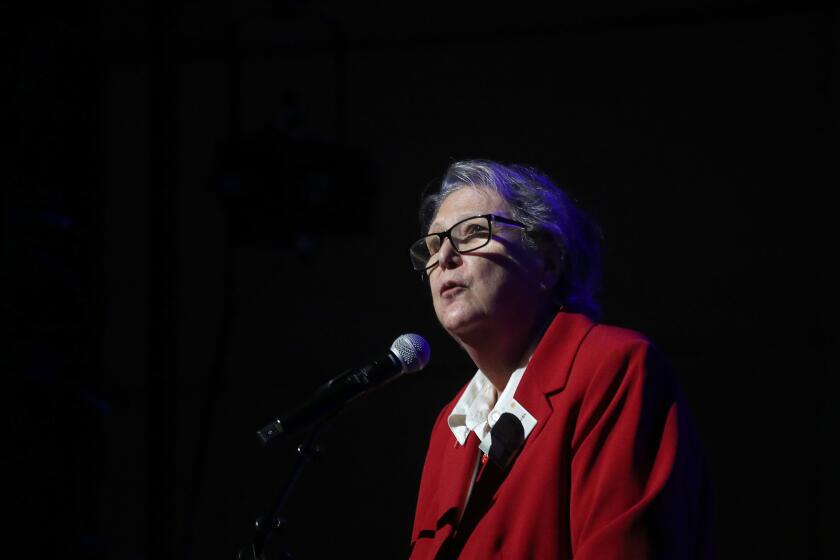Jackie Goldberg, bold supporter of LGBTQ+, Jewish, Muslim students, to lead L.A. school board

- Share via
Jackie Goldberg has had quite a year on the Los Angeles Board of Education, blazing into public view by reading aloud a storybook about families with two dads during a time of LGBTQ+ school protests and then standing up for Muslim and Jewish students after parents complained about bullying and classroom bias.
The veteran public official — who was also on the Los Angeles City Council and in the state Legislature — will end her elected political career as school board president, helping to guide the nation’s second largest school district. The board reelected Goldberg by a 7-0 vote Tuesday.
Goldberg, 79, who had been largely retired when she was persuaded to run for the school board in 2019, will serve her second of two consecutive one-year terms as president until 2024, her last year in office.
She will continue to influence district policy even as voters in her district choose her replacement, starting with a primary in March. That election’s outcome is destined to reshape the leadership of the nation’s second-largest school system.
Goldberg’s reelection as president transpired without rancor or controversy — even discussion — in advance of a year that could embody plenty of both. On one front, the district must deal with the end of state and federal COVID-19 aid that ballooned the budget to record levels.
“As a result of the pandemic, we finally saw what happens when we adequately fund public education: smaller class sizes, additional mental health support, and innovative programs to help struggling students,” Goldberg said. “Tragically, this year we are losing millions in supplemental funding. That is why the long-term solution is structural change — at the federal and state level — to adequately tax corporations and the wealthy so that we can fully fund our schools.”
Student achievement has not yet rebounded to pre-pandemic levels. And, even before the pandemic, academic performance ranged from disappointing to alarming.
“As I begin my last year as board president and, indeed, as an elected official, I am mindful of all that we have accomplished and all the work we have ahead of us,” said Goldberg, who also served as the Los Angeles Board of Education president 40 years ago. “We are working every day to bring attendance to pre-pandemic levels, to improve all students’ literacy and math skills and to make good on our commitment to special education, social emotional learning, and so much more.”
Also likely to attract attention in the coming year will be culture-clash debates and spillover from outside events, such as two that marked Goldberg’s year.
LAUSD Supt. Carvalho sent a letter affirming schools as safe and inclusive spaces after Muslim parents expressed concerns that their children had become targets.
After the Israel-Hamas war began on Oct. 7, L.A. schools Supt. Alberto Carvalho quickly signaled support for Israel — which prompted Palestinian families to protest that the district was being one-sided and implicitly empowering biased classroom discussions and bullying.
Goldberg, who is Jewish, responded with a strong statement of support for all children and families who have been victimized — and Carvalho followed suit with a restatement of similar sentiments distributed districtwide.
Goldberg achieved even more notice when she responded to tensions at Saticoy Elementary over a gay pride assembly. At a televised school board meeting, she read aloud from an oversized children’s book, “The Great Big Book of Families,” which talked about different kinds of families, including those with two moms or two dads.
“A great book,” she said after reading it from cover to cover. “I recommend it.”
The unanimous approval of a symbolic resolution sends a message that L.A. Unified will not back down from LGBTQ+ curriculum.
Last week she followed up by scheduling a staff presentation on sex and LGBTQ+ education. She said parents can inspect curriculum and opt of content, “but they may not opt out of people,” referring to the LGBTQ+ community.
A year ago, Goldberg’s rise to board president signaled a shift to priorities of the teachers union, which had strongly backed her campaign. During the year, this shift played out subtly and not always consistently.
Board members declined to cut further into the school police budget, for example, even though the teachers union and allied student activists called for eliminating funding for school police.
Separately, in the lead-up to a three-day strike in March, teachers union leaders denounced district leadership, including Goldberg, for releasing details of negotiations they deemed confidential. Goldberg explained that her intent had been only to recognize the good news that both sides were in contact with each other.
Although the strike was not averted, all unions approved new contracts with pay raises.
The teachers union is pleased with the board majority’s movement toward placing greater restrictions on when and where independent charter schools — most of which are nonunion — will be allowed to share space on district-operated campuses.
Whether such restrictions will increase or diminish will be a major issue in the coming elections, where the biggest funders typically are charter-school allies and the two largest unions — United Teachers Los Angeles and Local 99 of Service Employees International Union.
Goldberg represents District 5, which covers most of northeast L.A. Unified, including Eagle Rock, Glassell Park and Echo Park. To the southeast her district includes the cities of Huntington Park, Maywood and South Gate. Four candidates are vying to replace her.
Also leaving the board next year will be George McKenna. His District 1 stretches west from Koreatown to Mid-City to the Westside and south to Baldwin Hills and South L.A. Eight candidates are competing to win that seat.
Running for reelection will be Scott Schmerelson, who represents the west San Fernando Valley, and Tanya Ortiz Franklin, who represents the southern part of the school system down to the L.A. Harbor. Both of them will face challengers.
More to Read
Sign up for Essential California
The most important California stories and recommendations in your inbox every morning.
You may occasionally receive promotional content from the Los Angeles Times.













